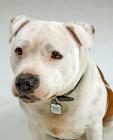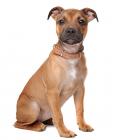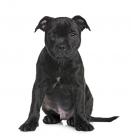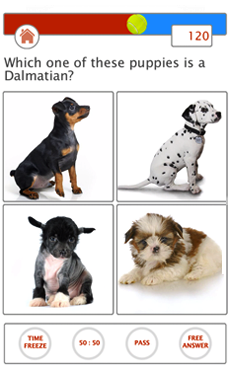Staffordshire Bull Terrier
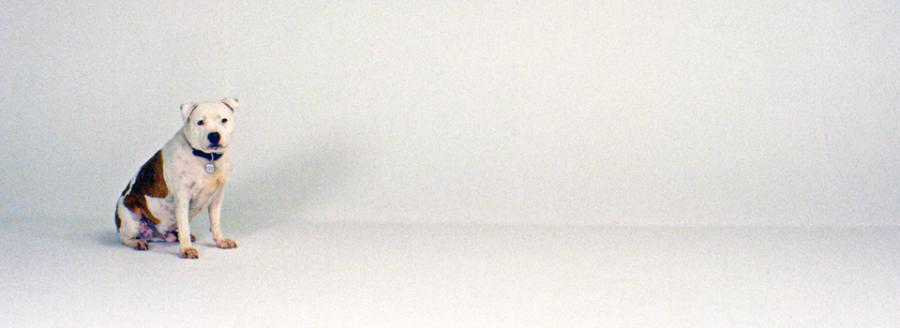
In my own words
You have a ball? Throw it! Throw it! I have bundles of energy and my heart goes a mile a minute when I see a ball. I may look like a small pup but I love a good run around with my owner. When we’re at the park sometimes other humans think I’m going to snarl… they think I’m violent but we’ve got a bad reputation. Please don’t hold our bad reputation against us! If you come across a bad Staffordshire terrier you come across a bad owner. Staffies (as we are affectionately known as) are people orientated pups. I love humans! Whilst we are tough, we are also loving creatures who like nothing more than to snuggle are compact little frames on the sofa for a stroke and a cuddle. I also have a beautifully short coat so you won’t get any stray hairs shedding round the house. In fact, I’m pretty low maintenance in general. A fine city dwelling pet!
My ideal owner(s)
Singles
Experienced dog handlers
City dwellers
Families
Outdoorsy types
What they say about me
Small and tough
Loving and gentle
Great with kids
Protective
Is this Staffordshire Bull Terrier for you?
Test your knowledge about the Staffordshire Bull Terrier
Information essential about the Staffordshire Bull Terrier
Kennel Club Group:
Category:
The Staffordshire bull terrier is a member of the Terrier group. They were originally bred for dog fighting and ratting; today they companions.
Average Height to withers: Males between 14-16 inches, Females from 13-15 inches. Average Weight: Males between 11kg-17kg, Females between 10kg-16kg.
Popularity:
Breed History:
It is generally accepted that Staffordshire bull terriers were bred in the 19th century from crossing a Bulldog with a terrier type to create a dog, which was used for dog fighting and bull baiting, both popular sporting entertainments at the time. By around 1835, animal fighting was made illegal. However, they still took place in secret in poorer areas where this type of dog grew in popularity. The dogs bore the short end of the stick with this activity as thousands of them were cast out after losing a fight or died in the ring.
Although they were known for their ferociousness and courage in the dog pits they made excellent family pets, being exceptionally good with children. They belonged to people from all walks of life, from lords to miners. Dog fighting wasn’t the only thing they were used for; they were also worked in badger hunting and as ratters. When these activities were outlawed some owners decided that they would try to maintain the breed by introducing them to the world of dog showing. A breed standard was created and the Staffordshire bull terrier was officially recognised by the Kennel Club in 1935.
Character:
Having something of an image problem at times, the general misconception about the temperament of this dog is that they are aggressive animals. The reality is that, while some misguided people do buy this type of dog as a ‘status symbol’ or to attain a ‘tough’ image, they can make great family pets when bought up, handled and trained with the patience and understanding needed by any dog to mould it into a family pet. Given the chance these dogs can be just that – a great family dog. They have boundless energy and enthusiasm wrapped up in a relatively small package and need to be given boundaries and direction to ensure that they know how to behave around people and other animals, especially as they can have a tendency to be a little antisocial around other animals – not surprising given their heritage. They are natural risk takers displaying little fear, for example when confronted with another aggressive dog. Despite this, they do have gentle nature and are exceptionally loyal, especially to one person. They will also learn to obey commands relatively quickly but be warned – they can have a stubborn streak and can choose to ignore them if they want! They are also powerful chewers and will resort to this is left along for prolonged periods, are bored or distressed. Ultimately, the Staffy owner must be able to display patience and commit the time to raising a rounded animal, especially if it is to live as part of the family with other animals in it.
Temperament:
The Staffie is an intelligent and active little dog, which gets on well with children and adults alike. They can be quite vocal, so they must be taught when to stop. They should be socialised, especially with other household pets, and training started at an early age. The Staffie is a hardy dog full of stamina, not quick to pick a fight, but more than able to defend them selves if necessary. They are affectionate dogs, much preferring human company to that of other dogs, this can be seen more in the adult dog than the puppy. They can, and some do, retain their puppy character throughout their lives, making them quite a handful. With their great sense of humour, intelligence and the fact they are boisterous life is never dull with a Staffie around. They can be very destructive if they are left alone at home for long periods of time.
Conformation:
The Staffie is a compact, powerfully built dog that is muscular all over. These short-coated dogs are very people orientated. They have a large square head with eyes that are set looking straight ahead. Their coats are short, smooth and close to the body.
The Staffordshire bull terrier should have a short head with a broad skull. The cheek muscles should be very pronounced and the nose should be short and black. The jaws should be strong, with large teeth, and have a complete scissor bite. The medium sized eyes should be round and dark in colour. The ears should not be large of heavy and should be half pricked. The neck is short, muscular and clean. The body is short, compact, muscular and well defined with a level top line. They are wide at the front and deep chested with well sprung ribs. The front legs should be straight, well boned and set well apart; the back legs should be muscular with well bent stifles. The feet should be of medium size, well padded and strong. The tail should be low set, of medium length and should not curl. The coat should be short, smooth and close.
Colour:
Their coat is short and smooth and can be a multitude of colours including red, fawn, white, black or blue, or any of these colours combined with white and/or brindle
Training:
The Staff is an intelligent dog that is relatively easy to obedience train. They do have a stubborn streak so a degree of firm handling is required. They can also be quite headstrong and boisterous, especially during adolescence. Early socialisation is a must for this terrier.
Staffordshire Bull Terriers combine toughness with a gentle sense of fun. They are friendly companions with an excellent sense of humour, always ready to play or goof around. They have lots of energy but can adapt to mellow situations and smaller spaces. Apartment living is perfectly fine for them.
. Fun and sometimes boisterous, the media and misguided people often portray or see them as aggressive dogs. In reality, this could not be further from the truth as with the correct breeding, handling and training these medium sized dogs will develop a big personality and like nothing more than a warm lap and a person whom they can devote themselves to
Care:
Health:
The Staffordshire bull terrier has the constitution of the proverbial Ox and while they can be affected by some common ailments which other breeds may be more prone to such as Cataracts. However, generally this is a very healthy breed. Due to the short hair of their coat, they can experience distress during the extremes of colder temperatures so care must be taken to ensure that they are not exposed for too long if this effects the. Some are prone to skin allergies and dermatitis, especially under their stomachs and in folds of skin causing the dog to chew, like and bite the area. This will simply serve to irritate it more and may cause thickening of the skin and generalised damage to the area. Veterinary advice should be sought in these cases. Other common health issues include cataracts, hip dysplasia and epilepsy. The average life span of a Staffordshire bull terrier is between 10-12 years and their average number of puppies in a litter is 4.
You may also like:
Staffordshire Bull Terriers looking for a home in UK »

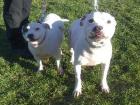



If you like Staffordshire Bull Terriers, you may be interested in breeds of the same size »

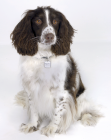

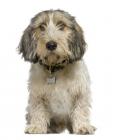

If you like Staffordshire Bull Terriers, you may like other breeds with similar characteristics »





If you like Staffordshire Bull Terriers, you may be interested in these other terrier dogs »
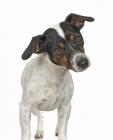

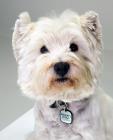


Advice on choosing your breed »
Find an animal shelter or rescue home where a Staffordshire Bull Terrier is waiting for a new home »
The following grid gives a fast track review, which covers all breeds. You can apply it to help you decide if a Staff is suitable for you, the environment where you live, your personality and your lifestyle. On the grid, 1= strongly disagree, and 5= strongly agree. For example, if you are looking for a dog to make a good walking companion, look down the list under ‘Activities’, and you will see that Staffs have lots of energy and are strong runners, scoring 5. If you want a dog that is good for city living, look under ‘Environment’ and you will see that Staffs are suited to urban living, scoring 5. You might like to save or print off this section and keep it for reference while you check some other breeds before making your final choice.
Add your own ratings on this breed »
|
*PLEASE NOTE: All our breed profiles are general, and all dogs are individuals. Always talk to the breeders and meet the owners you are buying from. Try to meet the dog and its parents if it is a puppy in their home environment.








